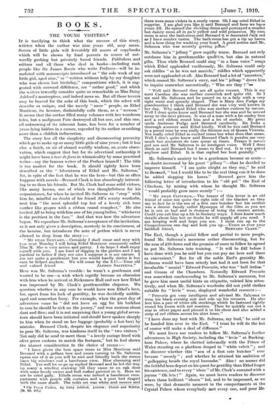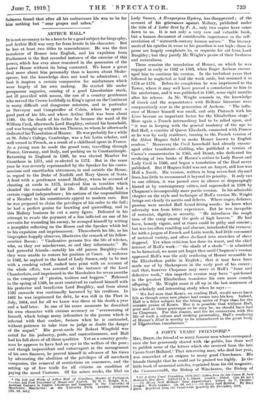BOOKS.
THE YOUNG VISITERS.* IT is terrifying to think what the success of this story, written when the author was nine years old, may mean. Scores of little girls will feverishly fill scores of copybooks which will be shown by fond parents to scores of out- wardly gushing but privately bored friends. Publishers and editors and all those who deal in books—including rash people like Sir James Barrie who write Prefaces—will be in- undated with manuscripts introduced as " the sole work of my little girl, aged nine," or " written without help by my daughter who was eleven last birthday," compositions which, it is sug- gested with outward diffidence, are "rather good," and which the writers inwardly consider quite as remarkable as Miss Daisy Ashford's masterpiece, and indeed more so. But all these terrors may be braved for the sake of this book, which the select will describe as unique, and the merely " mere " people, as Ethel
ontieue, its heroine, disdainfully calls them, as a "scream." It seems that the author filled many volumes with her wondrous tales, but a malignant Fate destroyed all but one, and this one, all unknowing of its inherent fame, has been for a number of years lying hidden in a corner, regarded by its author as nothing more than a childish indiscretion.
The story has all the simplicity and disconcerting precocity which go to make up so many little girls of nine years ; but it has also a finish, an air of absurd worldly wisdom, an, acute obser- vation, which suggest that but for its advertised authorship it might have been a tour de force in whimsicality by some practised writer—say the famous writer of the Preface himself ! The title is too modest for the book. It should rightly have been described as the " Adventures of Ethel and Mr. Salteena," for, in spite of the fact that he was the hero--but this so often happens with novels—Bernard Clark is less absorbingly interest- ing to us than his friends. But Mr. Clark had some solid virtues, like many heroes, one of which was thoughtfulness for his acquaintance, for when he invited Mr. Salteena to "stop" with him he, mindful no doubt of his friend Alf s scanty wardrobe, sent him "the most splendid top hat of a lovely rich tone rarther like grapes with a ribbon round cempleat." He also invited Alf to bring with him one of his young ladies, "whichever is the prettiest in the face." And that was how the adventure began. We reproduce Mr. Salteena's acceptance of the invitation, as it not only gives a description, masterly in its conciseness, of the heroine, but introduces the note of pathos which is never allowed to drop from the story :— " My DEAR BER]ARD,—Certainly I shall come and stay with you next Monday I will bring Ethel Monticue commonly called Miss M. She is very active and pretty. I do hope I shall enjoy myself with you. 1 am fond of digging in the garden and I am parshial to ladies if they are nice I suppose it is my nature. I am not quite a gentleman but you would hardly notice it but emit be helped anyhow. We will come by the 31.--Your old suul valued friend ALFRED SALTEExA." Here was Mr. Salteena's trouble : he wasn't a gentleman and wanted to be one—a wish which rapidly became an obsession with him when he arrived at Rickamere Hall and saw how Ethel was impressed by Mr. Clark's gentlemanlike elegance. We question whether in any case he would have won Ethel's love, for, apart from his lack of gentility, he was decidedly middle- aged and somewhat fussy. For example, when the great day of adventure came ho " did not have an egg for his brekfast in case he should be sick on the jorney," and was anxious about dust and flies; and it is not surprising that a young girl of seven- teen should have been irritated and should have spoken sharply to him when he stood on her luggage (probably a hat-box) by mistake. Bernard Clark, despite his elegance and superiority to poor Mr. Salteena, was kindness itself to the " two visitors." Not only did be send to meet them " a lovely cartage lined with olive green cushons to match the footman," but he had shown the utmost consideration in the choice of rooms :— " I have given the best spare room to Miss Monticue said Bernard with a gallant bow and yours turning to Mr. Salteena opens out of it so you will be nice and friendly both the rooms have big 'windows and is handsome view. Bow charming. said Ethel. Yee well let us go up replied Bernard and he led the way up many a winding stairway till they came to en oak door with some lovely swans and bull rushes painted on it. Here we are he cried gaily. Ethels room was indeed a handsome com- partment with purple silk curtains and a 4 post bed draped with the same shade. The toilit set was white and Inouye and • The Young Tilitere, By Daisy Ashford. London: Chatto and Windom. Pa lid. =kJ there were some violets in a costly varse. Oh I say cried Ethel in supprise. I am glad you like it said Bernard and here we have yours Alf. He opened the dividing doors and portrayed a smaller but dainty room all in pale yellow and wild. primroses. My own room is next the bathroom said Bernard it is decerated c'ark red as I have somber tastes. The bathroom has got a tip up base's and a hose thing for washing your head. A good notion said Mr. Salteeua who was secretly getting Jens."
Mr. Salteena'a " jellusy " grew rapidly worse. Bernard not only outshone him in gentlemanlike qualities, but also in natural gifts. Thus while Bernard could sing "in a base voice" songs which Ethel applauded vociferously, Mr. Salteena could only ask riddles " as he was not musicle," riddles which apparently were not applauded at all. Also Bernard had a lot of "ancesters," which roused Mr. Salteena's envy, and his " jellusy " drove him to inquire somewhat sarcastically, " Who arc they I Well said Bernard they are all quite correct. This is my aunt Caroline she was rarther exentrick and quite old. So I see said Mr. Salteena and he passed on to a lady with a very tight waist and queerly shaped. That is Mary Ann Fudge my grandmother I think said Bernard she was very. well known in her day. Why asked Ethel who was rarther curious by nature. Well I dont quite know said Bernard but she was and he moved away to the next picture. It was of a man with a fat smiley face and a red ribbon round him and a lot of medals. My great uncle Ambrose Fudge said Bernard carelessly. He looks a thorough ancester said Ethel kindly. Well he was said Bernard in a proud tone he was really the Sinister son of Queen Victoria. Not really cried Ethel in excited tones but what does that mean. Well I don't quite know said Bernard Clark it puzzles me very much but anteaters do turn queer at times. Peraps it means god son said Mr. Salteena in an inteligent voice. Well I dont think so said Bernard but I mean to find out. It is very grand anyhow said Ethel. It is that replied her host genie lly.
Mr. Salteena's anxiety to be a gentleman became so acute— no doubt increased by his great " jellusy "—that he decided to improve himself. " I am quite alright as they say," he said to Bernard, " but I would like to be the real thing can it be done he added slapping his knees." Bernard gave him the following letter of introduction to his " old pal " the Earl of Clincham, by mixing with whom he thought Mr. Salteena " would probably grow more seemly " :- ":Min DEAR CoNcrrAzi,—The bearer of this letter is an old friend of mine not quite the right side of the blanket as they say in fact he is the eon of a first rate butcher but his mother was a decent family called Hyssopps of the Glen so you ace he is not so bad and is desirous of being the correct article. Could you rub him up a bit in Socierty ways. I dont know much details about him but no doubt he will supply all you need. I am keeping well and hope you are. I must run up to the Compartments one day and look you up.—Yours as ever your faithfull friend, BERNARD CLARE."
The Earl, though a genial fellow and partial to mere people, found Mr. Salteena's mereness rather disconcerting, but for the sum of £10 down and the promise of more to follow he agreed to put Mr. Salteena into training. " It will be £42 before I have done with you he said but you can pay me here and there as convenient." But for all the noble Earl's geniality Mr. Salteena would have been utterly lost had it not been for that invaluable " menial " Edward Procurio, who was " half italic's" " and Groom of the Chambers. Naturally Edward Procurio was somewhat condescending to Mr. Salteena's merencss, but he gave him most useful hints on etiquette, valeted him atten- tively, and when Mr. Salteena's wardrobe did not yield clothes suitable for " levie " wear, displayed wonderful resource :— " Procurio got very intelligent and advised Mr. Salmons to were his black evening suit and role up his trousers. He also lent him a pair of white silk stockings which he fastened tightly round his knees with red rosettes. Then he quickly cut out a star in silver paper and pinned it to his chest and also added a strip of red ribbon across his shirt front."
" I have done my best with Mr. Salteena, my lord," he said as he handed him over to the Earl. " I trust he will do the hat of course will make a deal of diffidence."
We must leave our readers to follow Mr. Salteena's further adventures in High Society, including the " levie " at Bucking. ham Palace, where he chatted informally with the Prince of Wales standing on a platform draped in "white velvit " ; and to discover whether this " son of a first rate butcher " ever became " seemly " ; and whether he attained his ambition of " gallopping beside the royal baroushe." Alas ! no sooner did the faithful hero depart on his quest for gentility than Ethel forgot his existence, and to every " idear " of Mr. Clark's assented with a joyous " Oh lets 1" Again, we must leave readers to discover where those brilliant " idears " led, and to be impressed, as we were, by that dramatic moment in the compartments at the Crystal Palace where everybody met every one, and poor Mr. Salteena found that after all his endeavours life was to 'be for him nothing but " sour grapes and ashes." •



































 Previous page
Previous page